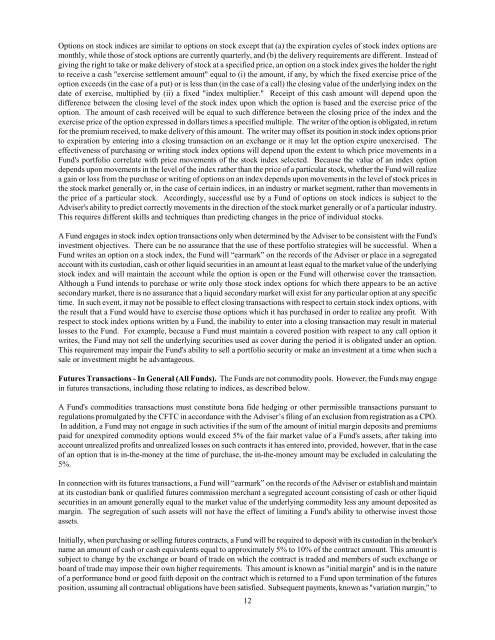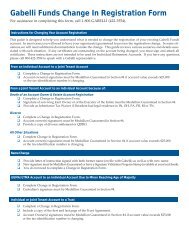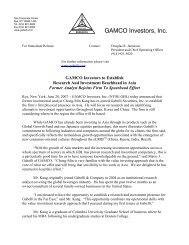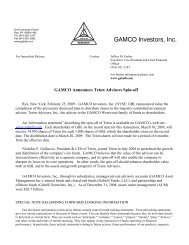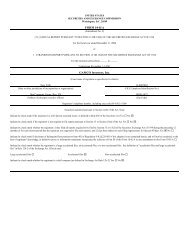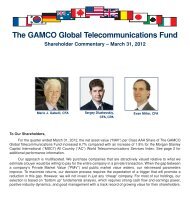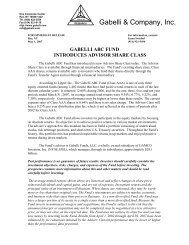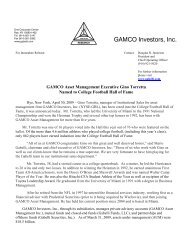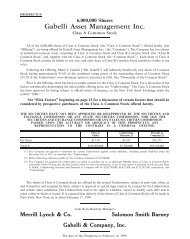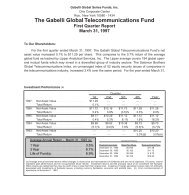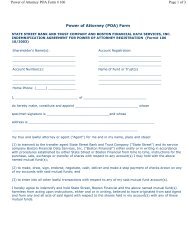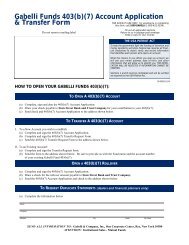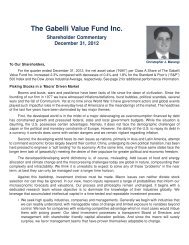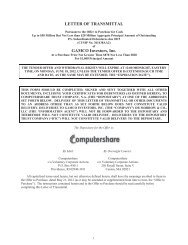Statement of Additional Info - Gabelli
Statement of Additional Info - Gabelli
Statement of Additional Info - Gabelli
Create successful ePaper yourself
Turn your PDF publications into a flip-book with our unique Google optimized e-Paper software.
Options on stock indices are similar to options on stock except that (a) the expiration cycles <strong>of</strong> stock index options are<br />
monthly, while those <strong>of</strong> stock options are currently quarterly, and (b) the delivery requirements are different. Instead <strong>of</strong><br />
giving the right to take or make delivery <strong>of</strong> stock at a specified price, an option on a stock index gives the holder the right<br />
to receive a cash "exercise settlement amount" equal to (i) the amount, if any, by which the fixed exercise price <strong>of</strong> the<br />
option exceeds (in the case <strong>of</strong> a put) or is less than (in the case <strong>of</strong> a call) the closing value <strong>of</strong> the underlying index on the<br />
date <strong>of</strong> exercise, multiplied by (ii) a fixed "index multiplier." Receipt <strong>of</strong> this cash amount will depend upon the<br />
difference between the closing level <strong>of</strong> the stock index upon which the option is based and the exercise price <strong>of</strong> the<br />
option. The amount <strong>of</strong> cash received will be equal to such difference between the closing price <strong>of</strong> the index and the<br />
exercise price <strong>of</strong> the option expressed in dollars times a specified multiple. The writer <strong>of</strong> the option is obligated, in return<br />
for the premium received, to make delivery <strong>of</strong> this amount. The writer may <strong>of</strong>fset its position in stock index options prior<br />
to expiration by entering into a closing transaction on an exchange or it may let the option expire unexercised. The<br />
effectiveness <strong>of</strong> purchasing or writing stock index options will depend upon the extent to which price movements in a<br />
Fund's portfolio correlate with price movements <strong>of</strong> the stock index selected. Because the value <strong>of</strong> an index option<br />
depends upon movements in the level <strong>of</strong> the index rather than the price <strong>of</strong> a particular stock, whether the Fund will realize<br />
a gain or loss from the purchase or writing <strong>of</strong> options on an index depends upon movements in the level <strong>of</strong> stock prices in<br />
the stock market generally or, in the case <strong>of</strong> certain indices, in an industry or market segment, rather than movements in<br />
the price <strong>of</strong> a particular stock. Accordingly, successful use by a Fund <strong>of</strong> options on stock indices is subject to the<br />
Adviser's ability to predict correctly movements in the direction <strong>of</strong> the stock market generally or <strong>of</strong> a particular industry.<br />
This requires different skills and techniques than predicting changes in the price <strong>of</strong> individual stocks.<br />
A Fund engages in stock index option transactions only when determined by the Adviser to be consistent with the Fund's<br />
investment objectives. There can be no assurance that the use <strong>of</strong> these portfolio strategies will be successful. When a<br />
Fund writes an option on a stock index, the Fund will “earmark” on the records <strong>of</strong> the Adviser or place in a segregated<br />
account with its custodian, cash or other liquid securities in an amount at least equal to the market value <strong>of</strong> the underlying<br />
stock index and will maintain the account while the option is open or the Fund will otherwise cover the transaction.<br />
Although a Fund intends to purchase or write only those stock index options for which there appears to be an active<br />
secondary market, there is no assurance that a liquid secondary market will exist for any particular option at any specific<br />
time. In such event, it may not be possible to effect closing transactions with respect to certain stock index options, with<br />
the result that a Fund would have to exercise those options which it has purchased in order to realize any pr<strong>of</strong>it. With<br />
respect to stock index options written by a Fund, the inability to enter into a closing transaction may result in material<br />
losses to the Fund. For example, because a Fund must maintain a covered position with respect to any call option it<br />
writes, the Fund may not sell the underlying securities used as cover during the period it is obligated under an option.<br />
This requirement may impair the Fund's ability to sell a portfolio security or make an investment at a time when such a<br />
sale or investment might be advantageous.<br />
Futures Transactions - In General (All Funds). The Funds are not commodity pools. However, the Funds may engage<br />
in futures transactions, including those relating to indices, as described below.<br />
A Fund's commodities transactions must constitute bona fide hedging or other permissible transactions pursuant to<br />
regulations promulgated by the CFTC in accordance with the Adviser’s filing <strong>of</strong> an exclusion from registration as a CPO.<br />
In addition, a Fund may not engage in such activities if the sum <strong>of</strong> the amount <strong>of</strong> initial margin deposits and premiums<br />
paid for unexpired commodity options would exceed 5% <strong>of</strong> the fair market value <strong>of</strong> a Fund's assets, after taking into<br />
account unrealized pr<strong>of</strong>its and unrealized losses on such contracts it has entered into, provided, however, that in the case<br />
<strong>of</strong> an option that is in-the-money at the time <strong>of</strong> purchase, the in-the-money amount may be excluded in calculating the<br />
5%.<br />
In connection with its futures transactions, a Fund will “earmark” on the records <strong>of</strong> the Adviser or establish and maintain<br />
at its custodian bank or qualified futures commission merchant a segregated account consisting <strong>of</strong> cash or other liquid<br />
securities in an amount generally equal to the market value <strong>of</strong> the underlying commodity less any amount deposited as<br />
margin. The segregation <strong>of</strong> such assets will not have the effect <strong>of</strong> limiting a Fund's ability to otherwise invest those<br />
assets.<br />
Initially, when purchasing or selling futures contracts, a Fund will be required to deposit with its custodian in the broker's<br />
name an amount <strong>of</strong> cash or cash equivalents equal to approximately 5% to 10% <strong>of</strong> the contract amount. This amount is<br />
subject to change by the exchange or board <strong>of</strong> trade on which the contract is traded and members <strong>of</strong> such exchange or<br />
board <strong>of</strong> trade may impose their own higher requirements. This amount is known as "initial margin" and is in the nature<br />
<strong>of</strong> a performance bond or good faith deposit on the contract which is returned to a Fund upon termination <strong>of</strong> the futures<br />
position, assuming all contractual obligations have been satisfied. Subsequent payments, known as "variation margin," to<br />
12


